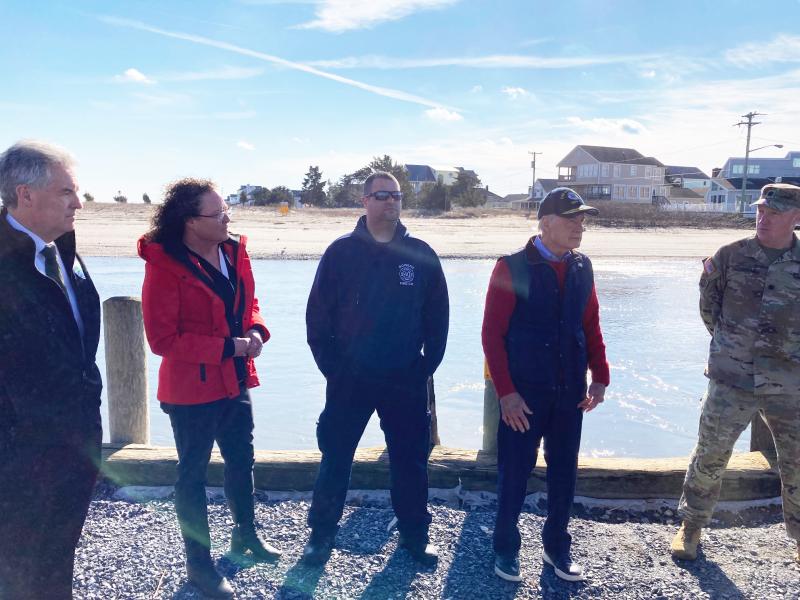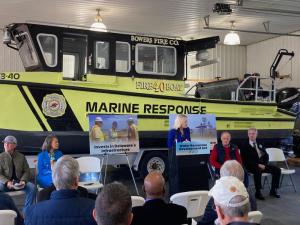Federal legislation protects shorelines, improves waterways

Federal, state and local officials came to the Bowers Beach firehouse Jan. 18 to celebrate the passage of federal legislation that aims to improve waterways throughout the state.
The Water Resources Development Act of 2022 is a bipartisan bill that seeks to protect beaches, shorelines and waterways across the country, improve academic research of water resources and, most importantly, eliminates red tape and increases funding for the U.S. Army Corps of Engineers to quickly tackle waterway projects.
The bill, cosponsored by Sen. Tom Carper and Rep. Lisa Blunt Rochester, will have a profound effect on Delaware. Part of the reason for the selection of the Bowers Beach was because it will enable quick action on dredging the Murderkill River channel, which will provide safer access for boaters and an easier path through for emergency vessels. The channel was dredged on an emergency basis in September.
Under the new bill, the Army Corps will have an updated emergency authority to provide greater support to Delaware beaches following hurricanes, nor’easters and other damaging storms. The Army Corps will also be able to enter into contracts, cooperative agreements, grants and other transactions with the University of Delaware to conduct academic research on areas such as water resource ecology, water quality, aquatic ecosystem restoration, coastal restoration research and water resource-related emergency management. The bill authorizes the Army Corps to waive the cost of technical assistance for economically disadvantaged communities and establishes a new Tribal and Disadvantaged Communities Advisory Committee to help the Army Corps more effectively deliver projects, programs and other assistance to tribes and economically disadvantaged communities, as well as increasing funding for the Army Corps that will lower local project costs for shoreline, riverbank and streambank protection and restoration for those communities.
In addition, the bill expands existing programs to fast-track the development and construction of shoreline, riverbank and streambank protection and restoration projects and makes shoreline protection more affordable for the bay beaches, such as Bowers and Slaughter beaches. Also provided is $35 million in each Delaware county for individual environmental infrastructure programs supporting drinking water, wastewater and stormwater infrastructure.
Lt. Gov. Bethany Hall-Long said, “This is a big deal. It is going to help coastal restoration. It’s going to address issues of climate. It is going to address issues of the infrastructure necessary for drinking water and wastewater.”
Blunt Rochester said, “This is all over the country, and one of the big areas that is different is the cost sharing. For example, in the past, maybe a town would have to foot 50% of the cost. This shifts and gives more resources for the Army Corps to have more support. This is everything from our local beach communities to riverbanks and inland areas that experience flooding or impacts of extreme weather.”
She said the bill expands the Army Corps’ mission and gives better clarity on its role in maintaining shorelines.
“This is really a game-changer in being able to address a pressing issue that, as we see, is affecting us now, but by 2050, will be 10 times worse,” Blunt Rochester said.
“Protecting our beautiful coastline and maintaining our ports and waterways is vital to our economic well-being in Delaware,” Carper said. “In the Water Resources Development Act of 2022, we secured much-needed investments in our state’s water infrastructure and provisions to make our low-lying state more resilient to the impacts of climate change. This bipartisan legislation is going to make Delaware a better place to work and live.”
Ryan Mavity covers Milton and the court system. He is married to Rachel Swick Mavity and has two kids, Alex and Jane. Ryan started with the Cape Gazette all the way back in February 2007, previously covering the City of Rehoboth Beach. A native of Easton, Md. and graduate of Towson University, Ryan enjoys watching the Baltimore Ravens, Washington Capitals and Baltimore Orioles in his spare time.






















































